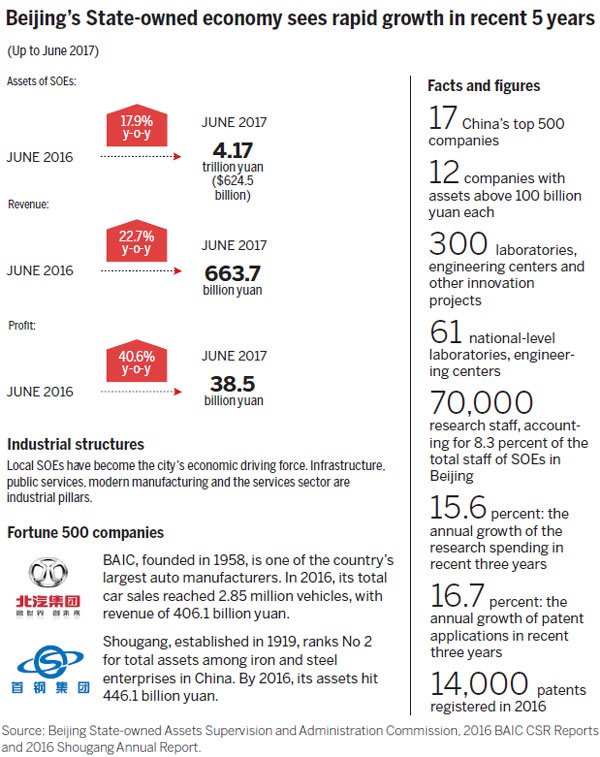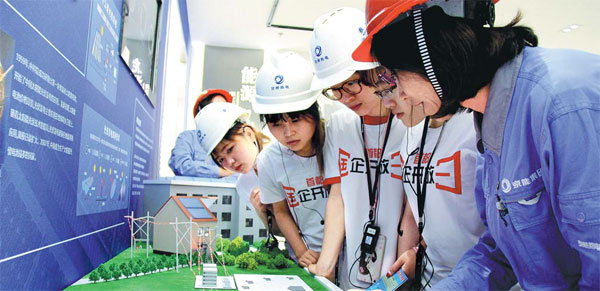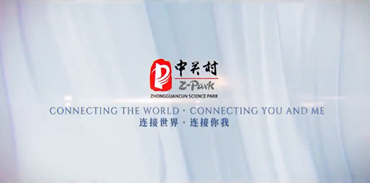Beijing SOEs support capital's urban reform projects
These companies boost economy, join in city's wide range of initiatives
The asset value of State-owned enterprises in Beijing has increased by 80.3 percent in the last five years, topping 4.17 trillion yuan ($624.5 billion), according to sources from Beijing State-owned Assets Supervision and Administration Commission.
The companies' combined revenue surged by 46.3 percent, their profit by 78.8 percent and their tax paid by 77.8 percent between 2012 and 2016.
In particular, SOEs in the Chinese capital saw their profits and revenue all sustain double digit growth last year.
|
Local students visit Beijing Jinqiao Power Co, an State-owned enterprise devoted to power generation for local residents. SOEs in Beijing play a pivotal role in the city's economy and benefit the nearby municipality of Tianjin and Hebei province. Photos provided to China Daily |
Last year, Beijing-based SOEs' combined revenue hit 1.22 trillion yuan, up 15 percent year-on-year. Profits grew to 66.5 billion yuan, up 16.2 percent year-on-year. Tax surged to 91.8 billion yuan, up 26.4 percent year-on-year.
The SOEs have steadily established a presence in higher level industries, while infrastructure and public services have remained solid. Beijing also benefits from strong support from SOEs in modern manufacturing, the service sector and emerging sectors.
A well-developed industrial structure supported by local SOEs has taken shape, the commission said.
SOEs involved in sewage treatment, solid waste treatment and environmental rehabilitation sectors have taken the lead in the country.
Modern service sectors, including tourism, healthcare and cultural creativity are in high gear, providing new economic impetus.
Innovation
SOEs' spending on research and development has grown by 15.6 percent year-on-year in the past three years, with new and high-tech sectors spending 5 percent of their business revenue on R&D.
BOE, a Beijing-based supplier of internet of things technologies, products and services, has achieved top rankings in the industry globally in terms of its patent applications and large display products' market presence.
BAIC, a car manufacturer with its headquarters in the capital, has been crowned market leader in pure electric car sales.
In a bid to promote synergic development, the Beijing State-owned Assets Supervision and Administration Commission signed an agreement with the national SOE watchdog, the State-owned Assets Supervision and Administration of the State Council.
The agreement aims to boost local SOEs' collaboration with their central peers.
The Beijing commission also joined hands with the administrative commission of Zhongguancun, known as China's Silicon Valley and a national-level high-tech demonstration zone, to build an SOE cloud innovation alliance in a bid to help with Beijing's cloud computing development.
Local SOEs have agreed 128 cooperation deals with high-tech companies in Zhongguancun to launch intelligent robots and innovative community projects.
They also extend their reach overseas, with several of them setting up overseas R&D centers in 49 countries and regions, including the United States, Germany, Spain, Italy and Japan.
Shouqi Group, part of the Beijing Tourism Group, is actively riding the Internet Plus tide to open an online car rental service network, becoming one of the country's top three car rental online service providers.
During the Beijing Science and Technology Award Conference this April, 26 local SOEs' achievements were honored. Among them, seven companies including BAIC, Beijing Energy Investment Holding and Beijing Institute of Architectural Design Group were honored with the seven top awards, accounting for one quarter of the total winners.
Development
In the last five years, the city's SOEs have undertaken a total of 15 pilot reforms, key to their successful development.
For example, Beijing Tourism Group's property ownership transfer and board of management reforms are under way and have been promoted across the whole country.
Shougang Group, one of China's top steelmakers, has become an industry leader in innovative reforms such as those covering land use, social security reform and other legacy problems inherited from traditional industrial companies.
Mergers between Beijing Energy and Beijing Coal, as well as Shoufa and Gonglian, the city's two public road groups, have completed.
A strategic reshuffle between Hebei-based Jidong Group and the Beijing-headquartered BBMG, both construction material providers, has significantly reduced overcapacity, becoming a prime example in the synergic development between Beijing and nearby province Hebei.
Local SOEs have also made progress in the capital markets. During the past five years, BAIC, China Securities and Beijing Certificate Authority launched initial public offerings.
BBMG and the Beijing Suburban Tourism Group saw all their assets go public.
To date, 58 Beijing SOEs have listed on stock exchanges, with their overall market value hitting 1.1 trillion yuan.
In a bid to supervise SOEs' businesses, local authorities have strengthened their information disclosure methods.
The SOEs are required to disclose information related to accounting, investment and key projects to the investors.
Local supervision authorities in different fields and of differing levels have strengthened their coordination in management, information sharing and planning for SOE reforms.
Service
In recent years, the Beijing municipal government announced it would vacate land space and renovate the city by moving illegal buildings and large wholesale markets in a bid to lessen the city's rising transport and population pressure.
SOEs are required to take the lead in closing businesses in the markets and removing those illegal buildings.
Beijing Urban Construction Group has completed renovations in Dongdan and Shuangxiu parks, releasing 19 rental booths, and removing 1,280 square meters of illegal buildings.
A total of 1,900 sq m of green land has been restored.
Five cement companies and two coal producers have been closed, removing production overcapacity of 3.9 million and 1.8 million metric tons, respectively.
In the last five years, 404 companies in lower level industries have been removed. Eighteen SOEs have taken part in the construction of the city's new eastern suburban hub in Tongzhou district.
The administrative area, park and infrastructure facilities are being built under the support of local SOEs.
The local authorities have called SOEs to devote themselves to corporate social responsibility. SOEs have taken part in 40 percent of livelihood projects in the Chinese capital.
New transport rail mileage has been extended by 132 kilometers.
SOEs have been involved in urban environment management, water, waste and sludge treatment.
They have joined in the three-year waterway clearance project in Beijing, playing an important role during the nation's campaign to transport water from South China to the north.
They have built 250,000 affordable apartments, accounting for one quarter of the city's total new residential construction in the field.
Beijing State-owned Assets Group, Beijing Enterprises Group and BBMG have launched nursing homes for senior citizens.
Beijing-Tianjin-Hebei rim
To boost the synergic growth in the Beijing, Tianjin and Hebei economic rim, the capital's SOEs have joined a number of industrial alliances. These include the Beijing-Tianjin-Hebei market development alliance, a tourism trade platform, and manufacturing industrial alliances, to name just a few.
Beijing's SOEs have signed 18 agreements with Caofeidian piloted industrial area, an emerging zone in Hebei, with an investment of 32.7 billion yuan for 5.5 sq km piloted area.
In another 4.6 sq km of area, construction of hospitals, schools and kindergartens have begun.
Major projects of Beijing Hyundai and Sanyuan Food have been completed and put into production.
Local SOEs have agreed to build a railway network with their counterparts in Hebei.
Construction is planned to complete by 2030, with the total city rail network hitting 3,172 km, extending the Beijing-Tangshan, Beijing-Binhai and intercity rail networks.
Located in the counties of Xiongxian, Anxin, Rongcheng and the surrounding areas, Xiongan New Area has caught the world's attention due to the scale of the project.
Beijing SOEs have vowed to join in the vast efforts related to its construction and economic growth.
yangcheng@chinadaily.com.cn

(China Daily 08/23/2017 page5)


